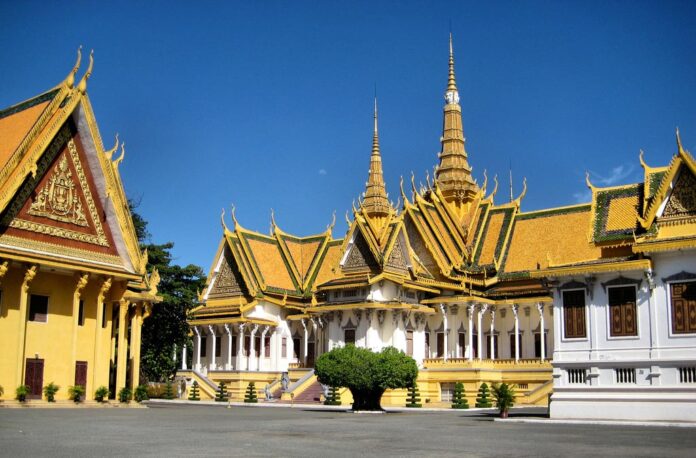The current King of Cambodia is Norodom Sihamoni. Born 14th May, 1953. His official title is Preah Karuna Preah Bat Sâmdach Preah Bâromneath Norodom Sihamoni Nai Preah Reacheanachak Kampuchea – meaning, “His Majesty, King Norodom Sihamoni of the Kingdom of Cambodia.” King Sihamoni is the eldest son of the former King, Norodom Sihanouk, and his seventh wife,Queen Monineath. He was named King on 14th October 2004 by the throne council, seven days after his father abdicated the throne due to ill health.
King Norodom Sihamoni has spent more of his life living outside Cambodia than residing in the country. He spent his early life in what is now the Czech Republic, where he studied classical dance and music until 1975. He returned to Cambodia briefly between 1977 and 1981 and was kept under house arrest with his father by the Khmer Rouge. After leaving the country in 1981, he spent the majority of the next 20 years in France, teaching ballet and holding the position of Cambodia’s delegate to UNESCO – the UN cultural body based in Paris.
King Norodom Sihamoni speaks Khmer, French, Czech and English. He is unmarried and has no children. His father is famously quoted as saying about his son: “He loves women as his sisters”.
Power and duties
According to the constitution of the Kingdom of Cambodia, the King of Cambodia shall reign but not govern. The King is inviolable, and is appointed head of state for life. While it is an appointed monarchy, the chosen monarch must descend from the blood line of King Ang Duong, King Norodom or King Sisowath. There is nothing in the constitution to suggest the appointment of a Queen, and the King cannot himself appoint an heir.
The King of Cambodia holds the authority to appoint the Prime Minister, Council of Ministers, and assumes the role of Supreme Commander of the Royal Khmer Armed Forces. However, in practical terms, the King possesses limited political and military power.
A significant portion of the King’s responsibilities is ceremonial in nature. This includes attending festivals throughout the country to pay tribute to the 23 Cambodian public holidays. Additionally, the King plays a crucial role in cultivating and strengthening relationships with other monarchs and ambassadors, representing Cambodia within the international community. Moreover, the King holds immense importance as a symbolic leader for the Cambodian people. The national motto, “Nation, Religion, King,” signifies the monarchy’s significance in the collective consciousness of the nation. The constitution also establishes the King as a unifying and everlasting symbol of the nation, safeguarding Cambodia’s independence, sovereignty, territorial integrity, and the rights and freedoms of its citizens, as well as guaranteeing adherence to international treaties.
It is highly disrespectful, not just to the King but to the entire country and its people, to criticize or make jokes about the King publicly, particularly in the presence of Cambodians. It is advisable to exercise caution and refrain from engaging in such behavior, as it can be seen as deeply disrespectful and offensive.
Former King, Norodom Sihanouk
It is difficult to talk about the “King” of Cambodia, without referring to King Norodom Sihamoni’s father, Norodom Sihanouk. Norodom Sihanouk was King of Cambodia from 1941 to 1955 and again from 1993 to 2004. He was also the effective ruler of Cambodia from 1953 to 1970. After his abdicated in 2004 he was referred to as the King Father of Cambodia – demonstrating the familial affection that nearly all Cambodians felt for their monarch.
The King Father was a hugely influential figure in Cambodian politics through much of the 20th century. He navigated his way to independence from France, and managed to keep relative stability for Cambodia in what was a very volatile region until his deposition in 1970 by Lon Nol. He was also a key figurehead in the Khmer Rouge revolution. The King Father supported the Khmer Rouge in their bid to overthrow the Lon Nol government and many of the soldiers who joined the Khmer Rouge cause felt they simply were “going to the hills to fight for their King” – and were not necessarily aware of, or subscribing to the radical Khmer Rouge ideology.
Of course, Sihanouk was held under house arrest by the Khmer Rouge leaders when he returned to Cambodia in 1976 and it was clear then that he was firmly against the new regime. However, neither was he supportive of the Vietnam-installed government that overthrew Pol Pot in 1979. Sihanouk was adamant that Cambodia’s seat on the UN should be kept empty, as neither the Khmer Rouge, nor the Vietnamese properly represented the Cambodian people. He formed his own party – the Coalition Government of Democratic Kampuchea (CGDK), which eventually agreed to peace with Hun Sen’s People’s Rebublic of Kampuchea party in 1991. Sihanouk was appointed to King again in 1993 but from this time until his abdication he suffered from worsening ill health, including colon cancer, diabetes, and hypertension. He died after a heart attack in Beijing, on 15 October 2012, 16 days before his 90th birthday. The country went into a period of mourning which culminated in the cremation of his body in Phnom Penh on 5th February. It was expected that 100,000 might line the streets of Phnom Penh to pay their respects as his body was carried through the city and lay in state for a full weekend. In fact, it is estimated over 1 million people made the journey, many coming from the far provinces in Cambodia, and staying in Phnom Penh for days – sometimes weeks – to say their farewells.
The current King, King Sihamoni, does not hold quite the same place in the hearts of people in Cambodia as his father. Having spent much time living outside of Cambodia, he is a relatively unknown figure, who, even now, is still much in his Father’s shadow. However, the love that people in Cambodia feel for their King Father, does result in a quiet respect for his son. It is interesting to see how his role develops as Cambodia goes through a period of economic growth and hopes to strengthen its position within the group of ASEAN nations and on the international stage.



